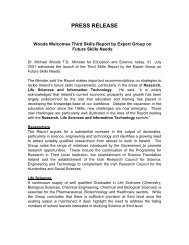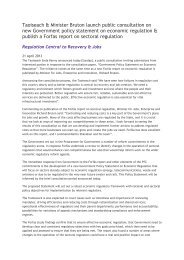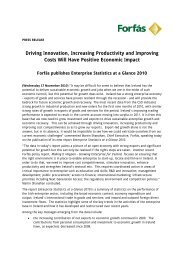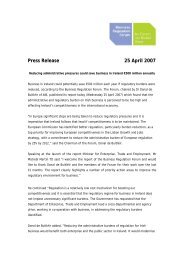National Code of Practice for Managing Intellectual Property ... - Forfás
National Code of Practice for Managing Intellectual Property ... - Forfás
National Code of Practice for Managing Intellectual Property ... - Forfás
You also want an ePaper? Increase the reach of your titles
YUMPU automatically turns print PDFs into web optimized ePapers that Google loves.
39<br />
4 Partners should have an agreed and documented process <strong>for</strong> identifying and evaluating potential<br />
exploitation routes.<br />
4 Partners are reminded to review background IP provisions on an ongoing basis.<br />
4 The valuation <strong>of</strong> early stage IP is very uncertain. Several factors should be considered in estimating value or<br />
potential value, <strong>for</strong> example:<br />
8 Market valuations – in other words “what is the current market willing to pay?”<br />
8 Third party assistance including, <strong>for</strong> example, input from industry and state agencies;<br />
8 Study <strong>of</strong> comparable existing subject matter, licences and commercialisation practices;<br />
8 Estimating projected sales based on market research;<br />
8 Development stage <strong>of</strong> the subject matter;<br />
8 Estimated cost <strong>of</strong> getting to market;<br />
8 Barriers to entry into markets;<br />
8 Estimated cost <strong>of</strong> patent process;<br />
8 Risks associated with taking a product to market.<br />
D.3 ACCESS AND USE BY PARTNERS FOR EDUCATION AND RESEARCH<br />
Partner(s) should retain rights to use and access knowledge and data arising from the project <strong>for</strong> the purposes <strong>of</strong><br />
research, while respecting confidentiality agreements. Access to background IP should be considered as part <strong>of</strong><br />
the ongoing discussion on background IP over the course <strong>of</strong> the project. Partners should recognise the possible<br />
limits on access required by the other party. In the case <strong>of</strong> the PRO, <strong>for</strong> example, access to enterprise background<br />
IP may be limited by confidentiality requirements concerning potentially patentable matter or third party rights<br />
to the background IP; in the case <strong>of</strong> industry, access to PRO background IP may be limited by the PRO having<br />
specific applications tied up with third parties or having reserved certain elements <strong>of</strong> background IP <strong>for</strong> its own<br />
commercialisation activities.

















